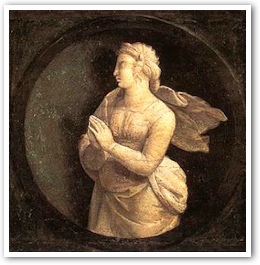God Our Father
- KENNETH BAKER, S.J.
In the Christian tradition, we are accustomed to call God our Father. Jesus himself taught us to pray, Our Father, who art in heaven, hallowed be thy name.
 |
And in the Creed, as soon as we profess our belief in one God, we immediately give him a personal name and designate him as the "Father".
To be a father, in the biological sense, means to communicate life and existence to another. For human beings, there is more to being a father than just generating a son or a daughter. For a father not only generates he also cares for his children by providing them with the material and spiritual things they need to grow up decently and enter into human society. In addition, the attentive father has a personal love for his children which elicits love from them in return. Since a father guides and directs his children until they can care for themselves, the notion of "father" includes the idea of authority over another, but normally in the sense of authority exercised in a spirit of love.
Of course we in America have some difficulties with these notions, since four out of ten marriages end up in divorce. This means that 40 per cent of our population grows up with more or less distorted idea of what a father is. Also, due to our urban society, many fathers spend a great deal of time away from their families. There are, moreover, the constant attacks on the integrity of the family. The authority of the father seems to be diminishing while the authority of the peer group is increasing.
In spite of these and other cultural difficulties we might have with the notion of "father", it is fundamental to all human society and is at least understood by all even by those who have never personally experienced the full depth of meaning of "father".
If we reflect a moment on who we are with our unlimited limitations, and who God is with his radiant infinity, it seems very bold to call God "Father". We are so weak. He is almighty. We are so sinful. He is holy. But Jesus teaches us in the Gospels to address God as "Father". When the disciples asked Jesus to teach them how to pray he told them to say, "Our Father." He told Mary Magdalene on that bright Easter morning in the garden to tell the Apostles, "I am ascending to my Father and your Father, to my God and your God" (Jn 20:17). For your Sunday Scriptural reading, I suggest that you read attentively the Sermon on the Mount, Matthew, chapters 5 to 7, and notice how often Jesus says "Father" when speaking of God. There he tells us to be perfect as the heavenly Father is perfect (Mt 5:48).
Because of our experience of fatherhood on the natural level, there is some justification in calling God "Father". The term was rarely used in the early books of the Old Testament, but became more common about two hundred years before Christ. It was Jesus, however, who really taught us to address God as "Father". Because Jesus is the only-begotten Son of God, having the same divine nature as the Father, there is a unique sense in which he calls God his Father. In his divine nature Jesus is the natural Son of the Father. By sending the Holy Spirit into our hearts when we believe and accept baptism Jesus gives us a share in his own divine life and so we become adopted sons and daughters of the Father.
Today there is much talk about "human dignity". Our true dignity comes from the fact that God loves each one of us and has destined all of us to be his children. And since we are all sons of God in Christ, that means that we are all brothers. With Christ we can all say Abba Father.
See the index of chapters from Fundamentals of Catholicism which have been reprinted to CERC here.
 This is J. Fraser Field, Founder of CERC. I hope you appreciated this piece. We curate these articles especially for believers like you.
This is J. Fraser Field, Founder of CERC. I hope you appreciated this piece. We curate these articles especially for believers like you.
Please show your appreciation by making a $3 donation. CERC is entirely reader supported.

Acknowledgement
Kenneth Baker, S.J. "God Our Father." In Fundamentals of Catholicism Vol. 1 Part 1, Chapter 4 (San Francisco: Ignatius Press, 1995), 30-32.
This article reprinted with permission from Father Kenneth Baker, S.J.
The Author

 Father Kenneth Baker, S.J., assumed editorship of Homiletic & Pastoral Review in April 1971 and remained in this position for almost forty years. In 1983 he published a three-volume explanation of the faith called Fundamentals of Catholicism Vol. 1, Creed and Commandments; Vol. 2, God, Trinity, Creation, Christ, Mary; and Vol. 3, Grace, the Church, the Sacraments, Eschatology
Father Kenneth Baker, S.J., assumed editorship of Homiletic & Pastoral Review in April 1971 and remained in this position for almost forty years. In 1983 he published a three-volume explanation of the faith called Fundamentals of Catholicism Vol. 1, Creed and Commandments; Vol. 2, God, Trinity, Creation, Christ, Mary; and Vol. 3, Grace, the Church, the Sacraments, Eschatology


